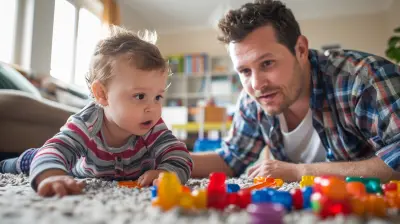Helping Your Child Find Joy in Learning and Discovery
16 August 2025
As parents, we all want the best for our children. We dream of them excelling academically, growing into curious individuals, and embracing knowledge with excitement. But let's be real—learning isn’t always a walk in the park for kids. Between school pressures, distractions, and sometimes even a lack of motivation, they might see learning as a chore rather than an adventure.
So, how can you help your child find joy in learning and discovery? The good news is, it’s entirely possible! With the right mindset, strategies, and a touch of creativity, you can turn learning into something they look forward to. Let’s dive into some practical and effective ways to make this happen. 
Why Joy in Learning Matters
Before we get into the "how," let's talk about the "why." Why should we care about making learning enjoyable for our kids?1. Fosters a Growth Mindset
When kids associate learning with excitement rather than pressure, they develop a growth mindset. They see mistakes as opportunities to improve instead of feeling defeated.2. Encourages Lifelong Learning
If a child enjoys the process of discovering new things, they won’t just stop learning when school ends. They’ll continue seeking knowledge throughout their lives.3. Reduces Academic Stress
Stress and pressure take the fun out of learning. When kids stop fearing failure and start enjoying the process, they perform better academically.4. Boosts Creativity and Critical Thinking
When children are genuinely engaged, they think outside the box, ask more questions, and experiment with solutions—skills that go far beyond the classroom.Now that we know why it's crucial, let’s explore how we can help our kids embrace learning with joy. 
Create a Positive Learning Environment
Kids thrive in an environment that fuels curiosity. A boring, rigid atmosphere can kill their interest faster than you can say "homework."1. Make Learning Feel Natural
Ever noticed how toddlers pick up words effortlessly? That’s because they learn in a natural setting through play, observation, and experience. Learning shouldn't feel forced—it should blend into their everyday life.2. Create a Learning-Friendly Space
A cozy, clutter-free, and welcoming space can make a big difference. A small reading nook, a dedicated craft table, or even a space for hands-on science experiments can spark their interest.3. Incorporate Different Learning Styles
Some kids learn best by reading, while others prefer hands-on activities or listening to stories. Pay attention to what works best for your child and incorporate those methods into their learning routine.
Make Learning Fun and Interactive
Textbooks alone won’t cut it. Kids need experiences that excite and engage them.1. Gamify Learning
Who doesn’t love a good game? Turning everyday lessons into games can make learning irresistible. Try educational board games, online learning apps, or even scavenger hunts to teach new concepts.2. Encourage Hands-On Activities
Reading about how plants grow is one thing, but planting a seed and watching it sprout? That’s a whole different level of learning! Hands-on experiences make abstract concepts tangible.3. Introduce Real-Life Applications
Ever heard your child ask, "Why do I need to learn this?" Show them! Use math while baking, explain science through everyday observations, or teach history by visiting museums instead of just reading books.4. Foster a Culture of Curiosity
Kids love to ask, "Why?" Instead of brushing off their questions, encourage them to dive deeper. If they ask, “Why is the sky blue?” don’t just answer—guide them to research it together. Make curiosity a habit!
Encourage a Love for Reading
A child who loves to read has an endless doorway to knowledge and imagination.1. Read to Them Daily
Even older kids benefit from hearing stories read aloud. It builds vocabulary, improves comprehension, and strengthens parent-child bonds.2. Let Them Choose Books
Forcing them to read something they don’t enjoy can backfire. Allow them to pick books that interest them, whether it's comics, adventure novels, or science magazines.3. Lead by Example
Kids imitate what they see. If they see you enjoying a book, chances are, they’ll develop an interest in reading too.Support Their Interests and Passions
Kids are naturally curious about things they love. Supporting their interests can make learning feel like a personal journey rather than an obligation.1. Pay Attention to Their Interests
Is your child obsessed with dinosaurs? Space? Art? Use their interests as a gateway to learning. A child fascinated by space might enjoy reading books about planets or watching documentaries.2. Provide Resources and Opportunities
If your child loves music, consider enrolling them in a music class. If they like building things, get them a set of Legos or STEM kits. Give them the tools they need to explore and grow.3. Celebrate Their Efforts, Not Just Successes
Applaud their hard work rather than just focusing on results. This builds confidence and keeps them motivated to learn more, even when they face challenges.Be Patient and Supportive
Let’s be honest—kids won’t always be enthusiastic about learning. And that’s okay! What matters is how we respond to those moments.1. Avoid Pressure and Comparisons
Every child learns at their own pace. Comparing them to others can crush their confidence. Instead, focus on their individual growth and improvement.2. Make Mistakes Part of the Process
Kids should feel safe making mistakes. When they stumble, help them understand that failure isn’t the opposite of success—it’s part of the journey.3. Stay Involved Without Taking Over
Be there to guide them, but don’t micromanage. If you do their homework for them, they miss out on the learning experience. Instead, encourage independence while offering support.Final Thoughts
Helping your child find joy in learning and discovery isn’t about pushing them to excel—it’s about nurturing their natural curiosity and making the process enjoyable. When learning feels like an adventure rather than a task, kids become eager explorers of knowledge.At the end of the day, the goal isn’t just good grades—it’s raising children who are excited to grow, question, and discover the world around them. And isn’t that what learning is truly about?
all images in this post were generated using AI tools
Category:
Back To School TipsAuthor:

Karen Hurst
Discussion
rate this article
2 comments
Kathleen McGlynn
Unlock the secret: joy in learning awaits, hidden beneath layers of curiosity.
December 1, 2025 at 5:05 PM

Karen Hurst
Absolutely! Embracing curiosity is key to igniting a lifelong love of learning in children.
Zevan Hines
Empowering our children to embrace learning as a joyful adventure is one of the greatest gifts we can give them. Let's celebrate each moment of curiosity and discovery together, nurturing a lifelong love of knowledge. Remember, every small step fuels their excitement and ignites their potential!
August 24, 2025 at 4:02 AM

Karen Hurst
Absolutely! Fostering a joyful learning environment nurtures curiosity and unlocks your child's full potential. Let's cherish each moment together!


